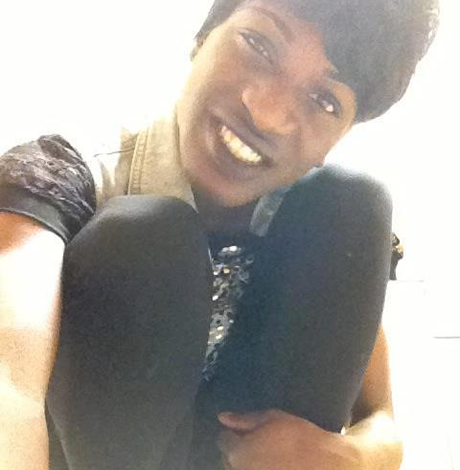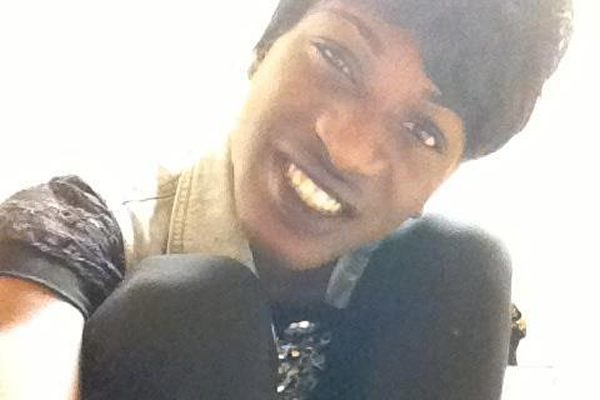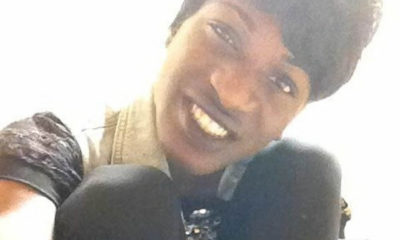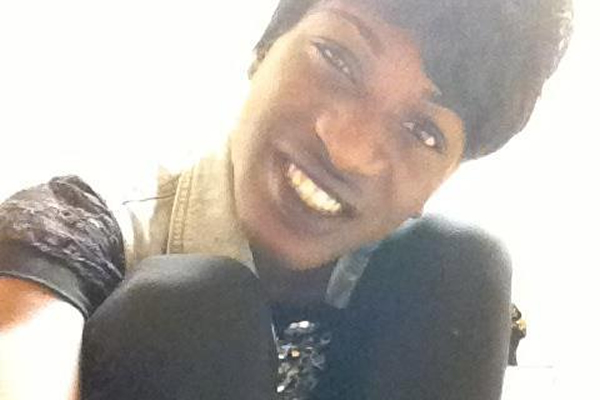Local
Jury deadlocked in trans murder case
Judge sends jurors back for further deliberations


A D.C. Superior Court jury on Wednesday announced it was unable to reach a unanimous verdict on whether two men were guilty or innocent of first-degree murder for the July 4, 2016 shooting death of transgender woman Deeniquia “Dee Dee” Dodds on a Northeast D.C. street.
But the jury disclosed through its foreperson that it found defendant Monte Johnson, 23, not guilty on seven of 15 other charges filed against him and found defendant Jolonta Little, 28, not guilty on five of the same 15 additional charges against him, including the charge of possession of a firearm during a crime of violence.
The jury reached just one guilty verdict, said the foreperson. Little was found guilty of a single count of carrying a pistol without a license outside of a home or business.
Judge Milton C. Lee then instructed the jury to return to the jury room to continue their deliberations and to make an earnest effort to reach verdicts on the remaining charges for which they were deadlocked.
The partial verdicts by the jury came at the conclusion of a month-long trial in which prosecutors with the U.S. Attorney’s Office argued that Little, Johnson and two other men targeted as many as seven transgender women for armed robberies along streets where female trans sex workers congregate on the night Dodds was shot.
The prosecutors, Assistant U.S. Attorneys Thomas Saunders and Ahmed Baset, told the jury Dodds was among the trans women targeted by the men in the early morning hours of July 4, 2016. The prosecutors said defendant Johnson fatally shot Dodds in the neck after she fought back when Johnson and another man implicated in the murder attempted to rob her at gunpoint.
The other man that allegedly targeted Dodds, Cyheme Hall, 23, and his brother, Shareem Hall, 25, had been charged along with Little and Johnson with first-degree murder while armed in connection with the Dodds murder. But prosecutors informed the jury at the start of the trial that the Hall brothers agreed to become cooperating witnesses for the government after pleading guilty to second-degree murder in the Dodds case.
In dramatic testimony at the trial, Cyheme Hall told the jury it was Johnson who shot Dodds in the neck at point blank range after she grabbed the barrel of his handgun as Johnson and Hall attempted to rob her on Division Ave., N.E. near where she lived. Hall testified that the plan among the men to commit robberies did not include the intent to kill anyone.
Although prosecutors presented numerous other witnesses who they said corroborated testimony by the Hall brothers, defense attorney Kevin Irving, who represents Johnson, and Brandi Harden, who represents Little, told the jury the Hall brothers were habitual liars with no credibility and anything they said in their testimony should be discounted.
The two defense attorneys pointed to what they said were inconsistencies in the Hall brothers’ testimony and noted that the Halls’ motives were aimed strictly at telling prosecutors what the prosecutors wanted to hear so they could get off with a lighter sentence.
The defense attorneys also argued repeatedly that jurors were required by law to find the defendants not guilty if they had a reasonable doubt about Johnson and Little’s guilt in any aspect of the complex circumstances surrounding the murder.
Prosecutor Saunders reminded the jury in his rebuttal argument last week that “solid” corroborating evidence linking Johnson and Little to the murder and a string of armed robberies of other trans women that took place on the night of the murder.
Among the key corroborating evidence, Saunders pointed out, was a GPS ankle bracelet that Little wore on the night of the murder stemming from a previous conviction and probation he received in an unrelated criminal case. The tracking of Little’s whereabouts that night by GPS experts placed him at the scene of three robberies Little and Johnson were charged with committing, including the scene where Dodds was shot, at the exact time those incidents occurred.
Saunders noted that prosecutors and police also tracked the cell phone conversations between Little and Johnson and the Hall brothers that they say placed them at the scene of the robberies and shooting.
In addition, Saunders pointed to recorded phone conversations played before the jury that the government obtained of Johnson talking with his girlfriend by phone while in jail awaiting trial for the Dodds murder in which prosecutors say he admitted committing the murder.
During Wednesday morning’s court session, the jury announced it found Little not guilty on seven separate counts of possession of a firearm during a crime of violence. The jury found him guilty of a single count of carrying a pistol without a license outside of a home or business.
The jury similarly found Johnson not guilty on five counts of possession of a firearm during a crime of violence. It did not find Johnson guilty of any charges as of Wednesday morning.
Among the charges against both men for which the jury reported it was deadlocked included felony murder while armed, conspiracy, assault with a dangerous weapon, robbery while armed, and additional counts of possession of a firearm during a crime of violence.
If the jury remains deadlocked on the charges it announced Wednesday morning it would be up to Judge Lee to decide whether to approve a possible request by prosecutors for a new trial or an expected motion by defense attorneys to dismiss the case.
District of Columbia
D.C. police arrest man for burglary at gay bar Spark Social House
Suspect ID’d from images captured by Spark Social House security cameras

D.C. police on Feb. 18 arrested a 63-year-old man “of no fixed address” for allegedly stealing cash from the registers at the gay bar Spark Social House after unlawfully entering the bar at 2009 14th St., N.W., around 12:04 a.m. after it had closed for business, according to a police incident report.
“Later that day officers canvassing for the suspect located him nearby,” a separate police statement says. “63-year-old Tony Jones of no fixed address was arrested and charged with Burglary II,” the statement says.
The police incident report states that the bar’s owner, Nick Tsusaki, told police investigators that the bar’s security cameras captured the image of a man who has frequently visited the bar and was believed to be homeless.
“Once inside, the defendant was observed via the establishment’s security cameras opening the cash register, removing U.S. currency, and placing the currency into the left front pocket of his jacket,” the report says.
Tsusaki told the Washington Blade that he and Spark’s employees have allowed Jones to enter the bar many times since it opened last year to use the bathroom in a gesture of compassion knowing he was homeless. Tsusaki said he is not aware of Jones ever having purchased anything during his visits.
According to Tsusaki, Spark closed for business at around 10:30 p.m. on the night of the incident at which time an employee did not properly lock the front entrance door. He said no employees or customers were present when the security cameras show Jones entering Spark through the front door around 12:04 a.m.
Tsusaki said the security camera images show Jones had been inside Spark for about three hours on the night of the burglary and show him taking cash out of two cash registers. He took a total of $300, Tsusaki said.
When Tsusaki and Spark employees arrived at the bar later in the day and discovered the cash was missing from the registers they immediately called police, Tsusaki told the Blade. Knowing that Jones often hung out along the 2000 block of 14th Street where Spark is located, Tsusaki said he went outside to look for him and saw him across the street and pointed Jones out to police, who then placed him under arrest.
A police arrest affidavit filed in court states that at the time they arrested him police found the stolen cash inside the pocket of the jacket Jones was wearing. It says after taking him into police custody officers found a powdered substance in a Ziploc bag also in Jones’s possession that tested positive for cocaine, resulting in him being charged with cocaine possession in addition to the burglary charge.
D.C. Superior Court records show a judge ordered Jones held in preventive detention at a Feb. 19 presentment hearing. The judge then scheduled a preliminary hearing for the case on Feb. 20, the outcome of which couldn’t immediately be obtained.
District of Columbia
Judge rescinds order against activist in Capital Pride lawsuit
Darren Pasha accused of stalking organization staff, board members, volunteers

A D.C. Superior Court judge on Feb.18 agreed to rescind his earlier ruling declaring local gay activist Darren Pasha in default for failing to attend a virtual court hearing regarding an anti-stalking lawsuit brought against him by the Capital Pride Alliance, the group that organizes D.C.’s annual Pride events.
The Capital Pride lawsuit, initially filed on Oct. 27, 2025, accuses Pasha of engaging in a year-long “course of conduct” of “harassment, intimidation, threats, manipulation, and coercive behavior” targeting Capital Pride staff, board members, and volunteers.
In his own court filings without retaining an attorney, Pasha has strongly denied the stalking related allegations against him, saying “no credible or admissible evidence has been provided” to show he engaged in any wrongdoing.
Judge Robert D. Okum nevertheless on Feb. 6 approved a temporary stay-away order requiring Pasha to stay at least 100 feet away from Capital Pride’s staff, volunteers, and board members until the time of a follow-up court hearing scheduled for April 17. He reduced the stay-away distance from 200 yards as requested by Capital Pride.
In his two-page order issued on Feb. 18, Okun stated that Pasha explained that he was involved in a scooter accident in which he was injured and his phone was damaged, preventing him from joining the Feb. 6 court hearing.
“Therefore, the court finds there is a good cause for vacating the default,” Okun states in his order.
At the time he initially approved the default order at the Feb. 6 hearing that Pasha didn’t attend, Okun scheduled an April 17 ex parte proof hearing in which Capital Pride could have requested a ruling in its favor seeking a permanent anti-stalking order against Pasha.
In his Feb. 18 ruling rescinding the default order Okun changed the April 17 ex parte proof hearing to an initial scheduling conference hearing in which a decision on the outcome of the case is not likely to happen.
In addition, he agreed to consider Pasha’s call for a jury trial and gave Capital Pride 14 days to contest that request. The Capital Pride lawsuit initially called for a non-jury trial by judge.
One request by Pasha that Okum denied was a call for him to order Capital Pride to stop its staff or volunteers from posting information about the lawsuit on social media. Pasha has said the D.C.-based online blog called DC Homos, which Pasha claims is operated by someone associated with Capital Pride, has been posting articles portraying him in a negative light and subjecting him to highly negative publicity.
“The defendant has not set forth a sufficient basis for the court to restrict the plaintiff’s social media postings, and the court therefore will deny the defendant’s request in his social media praecipe,” Okun states in his order.
A praecipe is a formal written document requesting action by a court.
Pasha called the order a positive development in his favor. He said he plans to file another motion with more information about what he calls the unfair and defamatory reports about him related to the lawsuit by DC Homos, with a call for the judge to reverse his decision not to order Capital Pride to stop social media postings about the lawsuit.
Pasha points to a video interview on the LGBTQ Team Rayceen broadcast, a link to which he sent to the Washington Blade, in which DC Homos operator Jose Romero acknowledged his association with Capital Pride Alliance.
Capital Pride Executive Director Ryan Bos didn’t immediately respond to a message from the Blade asking whether Romero was a volunteer or employee with Capital Pride.
Pasha also said he believes the latest order has the effect of rescinding the temporary stay away order against him approved by Okun in his earlier ruling, even though Okun makes no mention of the stay away order in his latest ruling. Capital Pride attorney Nick Harrison told the Blade the stay away order “remains in full force and effect.”
Harrison said Capital Pride has no further comment on the lawsuit.
District of Columbia
Trans activists arrested outside HHS headquarters in D.C.
Protesters demonstrated directive against gender-affirming care

Authorities on Tuesday arrested 24 activists outside the U.S. Department of Health and Human Services headquarters in D.C.
The Gender Liberation Movement, a national organization that uses direct action, media engagement, and policy advocacy to defend bodily autonomy and self-determination, organized the protest in which more than 50 activists participated. Organizers said the action was a response to changes in federal policy mandated by Executive Order 14187, titled “Protecting Children from Chemical and Surgical Mutilation.”
The order directs federal agencies and programs to work toward “significantly limiting youth access to gender-affirming care nationwide,” according to KFF, a nonpartisan, nonprofit organization that provides independent, fact-based information on national health issues. The executive order also includes claims about gender-affirming care and transgender youth that critics have described as misinformation.
Members of ACT UP NY and ACT UP Pittsburgh also participated in the demonstration, which took place on the final day of the public comment period for proposed federal rules that would restrict access to gender-affirming care.
Demonstrators blocked the building’s main entrance, holding a banner reading “HANDS OFF OUR ‘MONES,” while chanting, “HHS—RFK—TRANS YOUTH ARE NO DEBATE” and “NO HATE—NO FEAR—TRANS YOUTH ARE WELCOME HERE.”
“We want trans youth and their loving families to know that we see them, we cherish them, and we won’t let these attacks go on without a fight,” said GLM co-founder Raquel Willis. “We also want all Americans to understand that Trump, RFK, and their HHS won’t stop at trying to block care for trans youth — they’re coming for trans adults, for those who need treatment from insulin to SSRIs, and all those already failed by a broken health insurance system.”
“It is shameful and intentional that this administration is pitting communities against one another by weaponizing Medicaid funding to strip care from trans youth. This has nothing to do with protecting health and everything to do with political distraction,” added GLM co-founder Eliel Cruz. “They are targeting young people to deflect from their failure to deliver for working families across the country. Instead of restricting care, we should be expanding it. Healthcare is a human right, and it must be accessible to every person — without cost or exception.”

Despite HHS’s efforts to restrict gender-affirming care for trans youth, major medical associations — including the American Medical Association, the American Academy of Pediatrics, and the Endocrine Society — continue to regard such care as evidence-based treatment. Gender-affirming care can include psychotherapy, social support, and, when clinically appropriate, puberty blockers and hormone therapy.
The protest comes amid broader shifts in access to care nationwide.
NYU Langone Health recently announced it will stop providing transition-related medical care to minors and will no longer accept new patients into its Transgender Youth Health Program following President Donald Trump’s January 2025 executive order targeting trans healthcare.

















